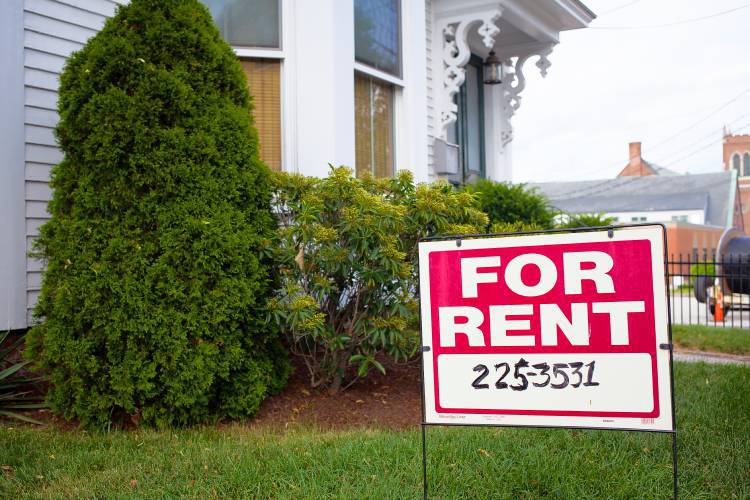Despite continued housing crisis, NH Senate votes to kill two bills to aid tenants

A "for rent" sign is seen outside a home on Washington Street in Concord on Wednesday, July 12, 2017. (ELIZABETH FRANTZ / Monitor staff) ELIZABETH FRANTZ
| Published: 04-07-2024 1:15 PM |
New Hampshire politicians agree that the state is in an unprecedented housing crisis. Home prices continue to remain at record highs and rental inventory is limited. But when it comes to solutions, protecting tenants’ rights and forcing landlords to accept low-income renters is not their answer.
On Friday, the Senate killed two bills that would have added further protections for renters – requiring landlords to provide 60 days notice for “renovation evictions” and providing incentives for landlords to accept housing choice vouchers.
At the end of a lease, landlords currently have a few options to terminate the contract – rent the unit to a family member, move in themselves or renovate the place.
The termination of a lease comes with 30 days notice, which in today’s housing market can leave tenants vulnerable and scrambling to find a new place. Senate Bill 519 would have required landlords to provide 60 days notice and up to six months of a discretionary stay.
On the eviction notice, the landlord would have to describe the intended repairs and time frame. They would also have to prove that the work could not be completed while the unit was occupied and that the work would take more than 30 days to complete.
When evicting a tenant to renovate, the landlord would also be expected to offer a different unit to rent, with the same number of bedrooms and at a monthly rate that doesn’t exceed what they currently pay. But if no such unit is available, that provision is no longer required.
Six months of discretionary stay would be required at the recommendation of a court. The tenant would continue to pay their monthly rent during this time, and if they failed to do so the landlord could issue an eviction for nonpayment of rent, giving them seven days to pack up and move out.
These measures would provide more protections for renters in a tight market, said Sen. Donna Soucy, a Democrat from Manchester and Senate Minority Leader.
Article continues after...
Yesterday's Most Read Articles
 Hometown Heroes: Couple’s sunflower fields in Concord reconnects the community to farming
Hometown Heroes: Couple’s sunflower fields in Concord reconnects the community to farming
 Boscawen resident takes issue with proposed town flag designs
Boscawen resident takes issue with proposed town flag designs
 Skepticism turns to enthusiasm: Concord Police welcome new social worker
Skepticism turns to enthusiasm: Concord Police welcome new social worker
 With new plan for multi-language learners, Concord School District shifts support for New American students
With new plan for multi-language learners, Concord School District shifts support for New American students
 With Concord down to one movie theater, is there a future to cinema-going?
With Concord down to one movie theater, is there a future to cinema-going?
 Opinion: The Concord School Board can restore trust with residents
Opinion: The Concord School Board can restore trust with residents
“It’s crucial to provide tenants with additional time so they can remain connected to their communities and employment,” she said.
The Senate Commerce Committee recommended unanimously that the bill pass, but on the floor Sen. Kevin Avard, a Nashua Republican, voted to lay the bill on the table. That motion passed on a voice vote.
Both issues are not new to the State House. Last year, a House bill proposed the same protections for renovation evictions, but it was killed on the floor.
New Hampshire has long stood as the lone state in New England where it’s perfectly legal for landlords to reject housing choice vouchers, commonly known as Section 8.
Several bills over the last few years have looked to change that – stating that it should be illegal to discriminate based on a source of income – but to no avail.
Senate Bill 517 took a different approach, however.
The bill would have created a fund to provide monetary incentives for landlords to accept housing vouchers and provide assistance for tenants. The program could be used to offset the costs of bringing a unit up to code to meet required inspections or for a tenant’s security deposit.
The Landlord Housing Incentive Program would have been housed within New Hampshire Housing Finance Authority, with $1 million allocated for the next fiscal year.
Different programs have tried to mimic this idea at the local level. In Concord, the Concord Coalition to End Homelessness created a landlord incentive program to encourage local property owners to rent to people transitioning out of homelessness, many of whom have vouchers.
However, there was little interest from local landlords to get the program off the ground.
The Senate Commerce Committee recommended the proposal unanimously, however, Senate Finance then moved to refer the bill for interim study.
Cindy Rosenwald, a Nashua Democrat, said she regretted voting in favor of an interim study. On the floor, she asked Senators to reconsider passing the proposal.
While building housing can help alleviate the current crunch, that takes years. And as homelessness continues to rise across the nation, and in New Hampshire, it’s essential to house vulnerable people in the state.
If Senate Finance was concerned about funding, the committee could have voted to amend the bill to allocate $1 to the program. That would have at least established the fund and left filling it as a consideration for the next budget cycle, she said.
“We still have a housing problem. It is particularly severe for low-income residents and I don’t think it’s going away anytime soon,” she said. “Sending this bill for interim study doesn’t do anything to solve the problem.”
But the Senate, voted in favor of the question, referring the bill for interim study, essentially killing it for this session.


 Voice of the Pride: Merrimack Valley sophomore Nick Gelinas never misses a game
Voice of the Pride: Merrimack Valley sophomore Nick Gelinas never misses a game With less than three months left, Concord Casino hasn’t found a buyer
With less than three months left, Concord Casino hasn’t found a buyer Kearsarge Middle School drone team headed to West Virginia competition
Kearsarge Middle School drone team headed to West Virginia competition Phenix Hall, Christ the King food pantry, rail trail on Concord planning board’s agenda
Phenix Hall, Christ the King food pantry, rail trail on Concord planning board’s agenda
